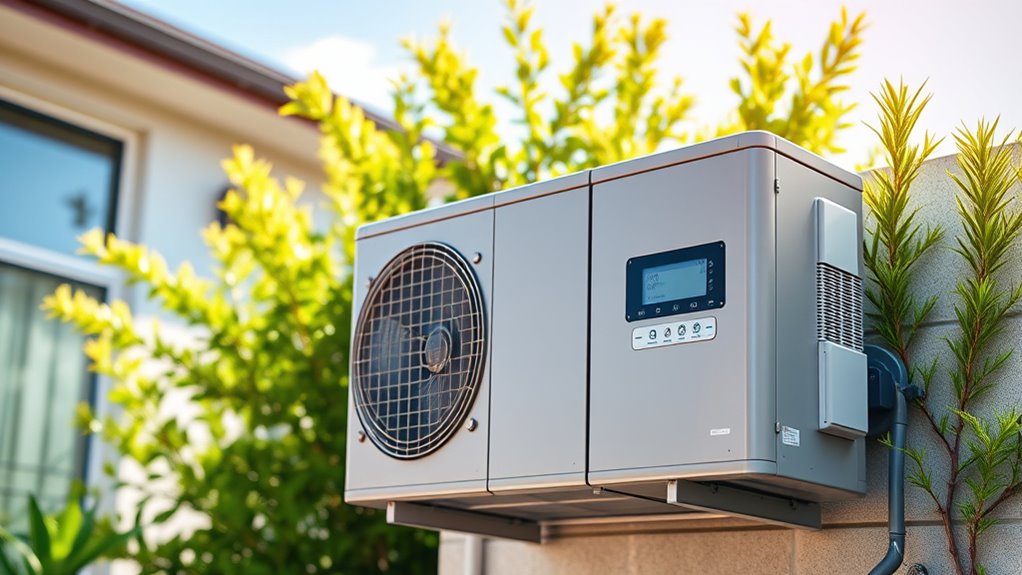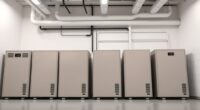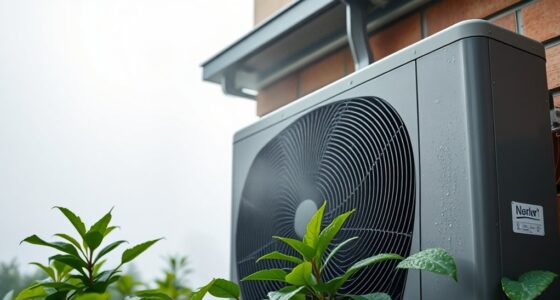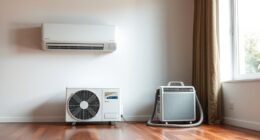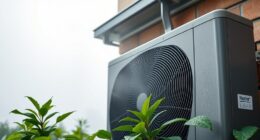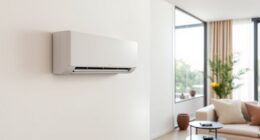Heat pumps can replace traditional air conditioning systems because they use refrigerant cycles and compressors to cool your home efficiently. Unlike standard AC units, they also reverse refrigerant flow with a reversing valve, providing heating during colder months. Modern models work well in various climates, saving you energy and money over time. If you want to understand how these systems adapt to your needs and climate, there’s more to discover below.
Key Takeaways
- Heat pumps use refrigerant cycles and compressors similar to traditional AC units for efficient cooling.
- They can reverse refrigerant flow, enabling seamless switch from cooling to heating modes.
- Modern heat pumps offer high SEER ratings, providing energy savings comparable to or better than traditional AC systems.
- They require compatible ductwork or ductless setups to replace existing air conditioning infrastructure effectively.
- Advanced heat pumps operate efficiently in various climates, making them a versatile all-in-one replacement for cooling needs.
Understanding the Core Functionality of Heat Pumps and Air Conditioners

Both heat pumps and air conditioners rely on refrigerant cycles and compressors to transfer heat from inside your home to the outside. During cooling, they remove heat from indoor air and expel it outside through the outdoor units, which often look alike. The compressor pressurizes the refrigerant, enabling heat transfer from indoor air to the refrigerant, which is then released outside. Heat pumps stand out because they include a reversing valve, allowing them to switch between cooling and heating modes by reversing the refrigerant flow. This flexibility means they can provide year-round comfort. Additionally, high-quality components in heat pumps can improve their efficiency and longevity. They are designed to operate efficiently in various climates, which can be influenced by the local environment and installation quality. Advances in technology have also increased the effectiveness of heat pumps in colder weather, making them more versatile than traditional systems. For example, some modern heat pumps incorporate variable-speed compressors, which adjust their operation to optimize energy use and performance. Moreover, the cost-effectiveness of heat pumps can make them a more attractive option for many homeowners compared to conventional units. Remember, neither system produces cold air directly; instead, they move heat energy, creating a cooling effect inside your home while expelling heat outside efficiently.
Comparing the Cooling Capabilities of Heat Pumps and Traditional AC Units
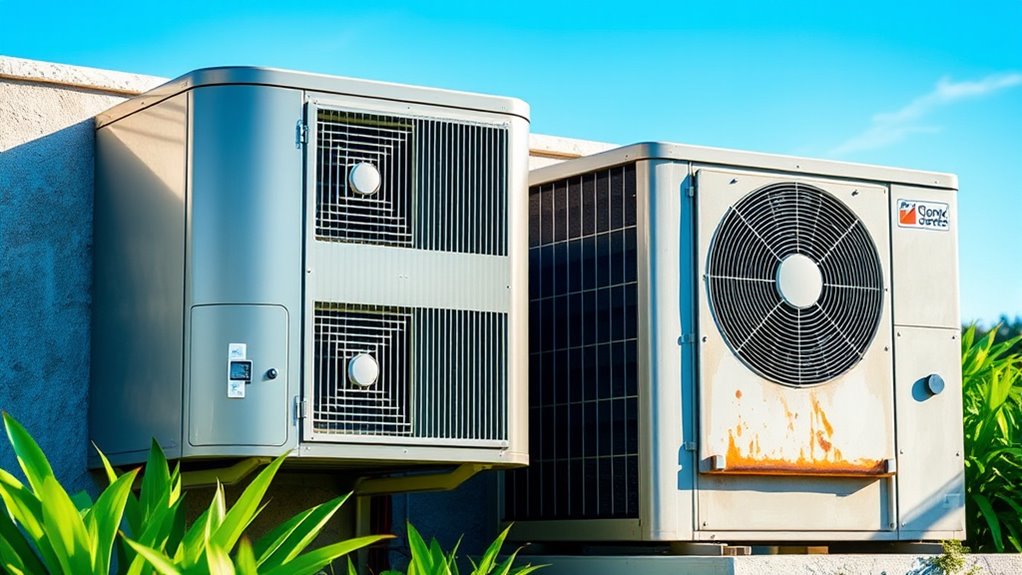
Both heat pumps and traditional air conditioners use refrigerant cycles to cool your indoor space efficiently. When in cooling mode, heat pumps transfer heat outside just like standard AC units, making their performance comparable. Plus, heat pumps can reverse their operation, but during summer, their cooling capacity matches that of dedicated air conditioners. Additionally, heat pumps often incorporate pet hair management features such as washable filters and specialized cleaning tools, which can help maintain cleaner indoor air quality. These features are especially helpful for households with allergy sufferers, as they contribute to improved air purity and comfort. Furthermore, the energy efficiency of heat pumps can lead to significant cost savings over time compared to traditional systems. Proper maintenance of filters and components can also enhance their overall performance, ensuring they operate at optimal capacity and extend the lifespan of the system. Regular upkeep, including filter replacements, can further improve system longevity and efficiency.
Cooling Process Similarities
Heat pumps and traditional air conditioners share a similar cooling process that effectively lowers indoor temperatures. Both systems rely on the refrigerant cycle, where heat transfer occurs through an evaporator coil inside your home. During cooling, the refrigerant absorbs heat from indoor air, cooling it down. The compressor then raises the refrigerant’s pressure and temperature, allowing heat to be expelled outside. This process is identical to standard air conditioning operation and results in comfortable indoor air. The cooling efficiency of both units depends on high SEER ratings, which measure how effectively they remove heat. Additionally, innovations in AI security are influencing the development of smarter, more secure cooling systems that can adapt to user needs. Overall, heat pumps in cooling mode perform like traditional AC units, providing comparable cooling capabilities and air comfort through this shared refrigerant cycle. Additionally, advancements in sound healing science are being explored to improve the noise levels and overall comfort of these cooling systems. Understanding the refrigerant cycle is essential for appreciating how these systems work efficiently and sustainably, especially as newer models incorporate energy-efficient technologies. For example, the incorporation of advanced compressor designs has increased efficiency and reduced energy consumption in modern heat pumps.
Heat Transfer Reversibility
While traditional air conditioners only remove heat from indoor spaces, heat pumps can reverse this process, offering both cooling and heating. This is possible thanks to a reversing valve that switches the refrigerant cycle’s direction, enabling efficient heat transfer in either mode. When cooling, refrigerant flow moves heat from indoor air to the outdoor unit; for heating, the cycle reverses, bringing warmth inside. This versatility enhances HVAC efficiency, allowing one system to serve dual purposes. Additionally, advances in smart controls are further improving the performance and user experience of heat pumps. Modern technology can optimize energy use and adapt to user preferences, making heat pumps even more efficient and convenient for everyday use. For example, integrated automation systems help tailor operation schedules to maximize comfort and savings, while also providing energy management benefits. Incorporating reversible heat transfer capabilities allows heat pumps to function effectively across different climates and seasons, expanding their application and value.
Assessing the Heating Versatility of Heat Pumps as a Replacement for Separate Systems

Evaluating the heating versatility of heat pumps reveals that they are increasingly capable of replacing traditional systems across various climates. Modern heat pumps efficiently deliver both heating and cooling, allowing you to replace separate systems like furnaces and air conditioners with a single unit. Many models operate effectively in cold climates, down to -20°F, making them reliable for year-round climate control. In colder regions, hybrid systems combining heat pumps with traditional furnaces ensure consistent comfort and dependability. Their versatility not only simplifies your setup but also enhances efficiency, reducing energy costs. As technological advances continue, heat pumps become a practical alternative, providing extensive heating and cooling solutions that adapt seamlessly to diverse climate conditions. Proper sizing of heat pumps is crucial to maximize their efficiency and lifespan in various applications. Additionally, advances in cold climate technology are expanding the effective operational range of heat pumps, making them suitable even in extremely low temperatures. The development of reliable cold weather performance further ensures their effectiveness in harsh winter conditions. Incorporating energy-efficient components can also improve their performance and reduce operational expenses over time.
Evaluating Energy Efficiency and Cost Savings With Heat Pumps
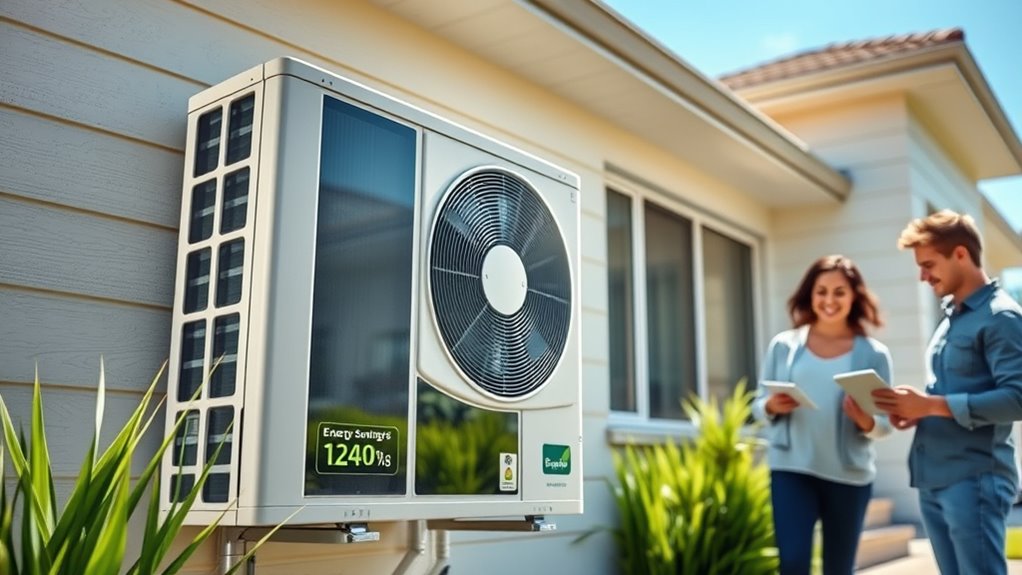
When comparing energy use, heat pumps deliver up to 300% more output for each dollar spent on electricity, making them highly efficient. Over time, these savings can add up markedly, especially in moderate climates where they operate most effectively. Considering federal incentives and lower energy bills, heat pumps often prove to be a smarter, cost-effective choice in the long run. Additionally, advanced technology can help homeowners feel more confident in switching to energy-efficient systems. Understanding performance metrics related to heat pump efficiency can further support making an informed decision. Properly maintained heat pumps can also contribute to improved indoor air quality by incorporating features like air filtration, which enhances overall health benefits.
Energy Consumption Comparison
Heat pumps stand out for their impressive energy efficiency, often delivering significant cost savings compared to traditional air conditioning systems. Thanks to their advanced cooling technology and high SEER ratings—up to 20—they use less energy to cool spaces. Typically, heat pumps consume 30-50% less energy during cooling, reducing your annual energy bills substantially. Modern heat pumps excel in performance in cold weather, offering cost-effective heating without relying on electric resistance heating. Here’s a comparison:
| Feature | Traditional Air Conditioners | Modern Heat Pumps | Savings Potential |
|---|---|---|---|
| SEER Ratings | Up to 16 | Up to 20+ | Higher efficiency |
| Energy Consumption | Higher | Lower | 30-50% less |
| Performance in Cold Weather | Limited | Improved with tech | Better year-round |
| Heating Capability | Electric resistance heating | Cost-effective heating | Reduced energy costs |
| Impact on Annual Bills | Higher | Lower | Significant savings |
Long-Term Cost Benefits
Thanks to their high SEER ratings and dual heating and cooling functions, heat pumps offer substantial long-term savings on energy bills. Their superior energy efficiency reduces utility bills markedly, especially with SEER ratings of 20 or higher. Although the initial cost may seem higher, government incentives like tax credits and rebates help offset installation expenses, making the replacement cost more manageable. Over time, lower operating costs contribute to impressive long-term savings, with studies showing households save around $370 annually. By using refrigerant technology, heat pumps cut energy consumption and carbon emissions, promoting eco-friendliness. With reduced energy bills and incentives, heat pumps deliver a cost-effective solution that enhances savings and minimizes environmental impact in the long run.
Analyzing Climate Suitability and Performance in Different Weather Conditions
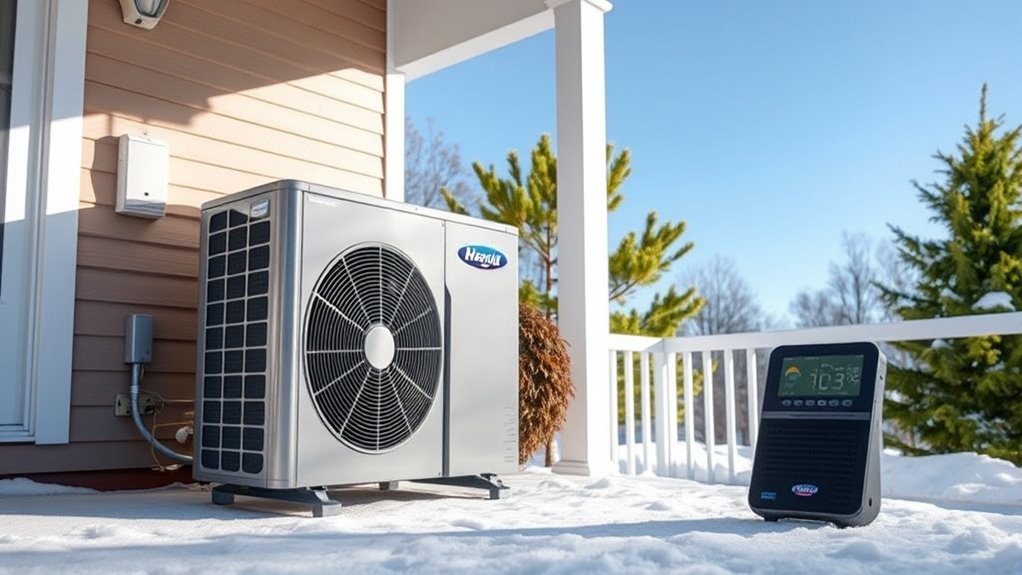
Modern heat pumps have proven their ability to perform effectively across a wide range of climates, making them a versatile alternative to traditional HVAC systems. Their climate suitability depends on weather conditions, with technological advances enhancing performance in extreme temperatures. In colder climates, heat pumps can operate reliably down to -20°F, especially when paired with hybrid systems that combine traditional furnaces for severe cold. In hot climates, they efficiently transfer heat outside, providing cooling similar to conventional air conditioners. Regional factors influence system capacity and features needed for ideal efficiency.
| Climate Type | Performance Features |
|---|---|
| Colder climates | Operate effectively at low temperatures, use hybrid systems for severe winter cold |
| Hot climates | Provide efficient cooling by heat transfer outside |
| Moderate climates | Maintain high efficiency with minimal adjustments |
| Extreme weather | Enhanced refrigerants and variable-speed compressors improve reliability |
Considering Installation Requirements and System Compatibility
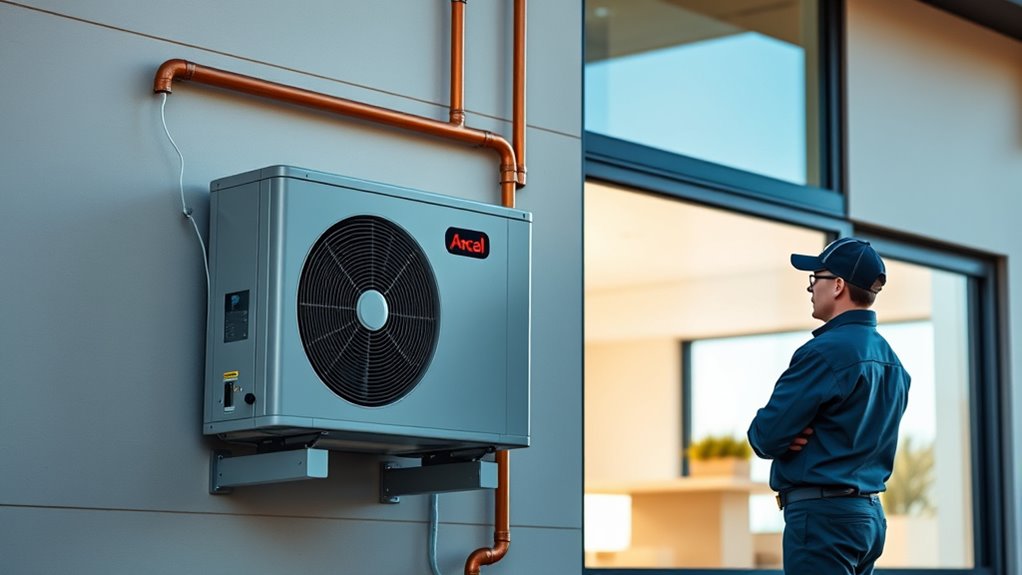
Before installing a heat pump, you need to assess whether your existing system can support it. This involves evaluating your current HVAC setup and determining if modifications are necessary for ideal system integration. Consider the following:
- Ductwork: Confirm your ductwork is compatible and properly sized for the heat pump.
- Upgrades: You might need upgrades to your duct system or insulation for efficiency.
- Electrical work: Check if your electrical panel can handle the heat pump’s power demands; upgrades may be required.
- System compatibility: Some homes require ductless or hybrid solutions, especially if existing infrastructure isn’t compatible or needs modifications.
A professional assessment helps you identify necessary adjustments, ensuring a smooth installation and effective system performance.
Exploring the Long-Term Benefits of Transitioning to a Heat Pump System
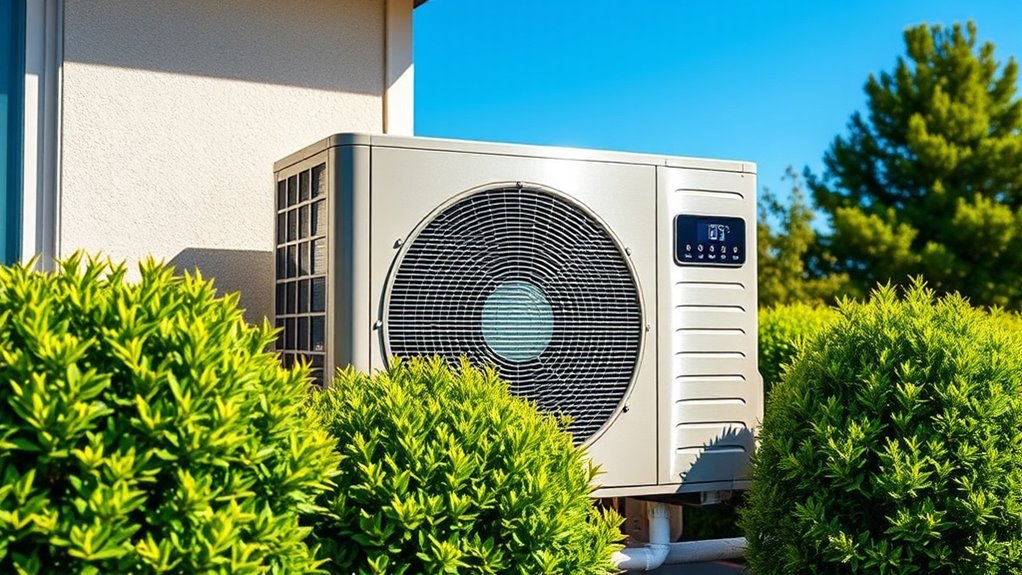
Switching to a heat pump can offer substantial long-term savings and environmental benefits. You’ll see reduced annual energy costs, sometimes saving up to $370, especially if replacing fuel-based systems. Heat pumps provide efficient, year-round climate control, combining home heating and cooling into one durable system. Plus, federal incentives can help offset initial costs, making this a smart investment. Over time, you’ll notice lower carbon emissions and less maintenance. To visualize the advantages:
| Benefit | Explanation | Impact |
|---|---|---|
| Cost Savings | Reduced energy bills | Increased savings |
| Energy Efficiency | Uses less power for same comfort | Lower environmental footprint |
| Durability | Long-lasting with proper care | Fewer replacements needed |
Embrace heat pumps for a reliable, eco-friendly HVAC system that pays off long-term.
Recognizing Signs That Your Existing Air Conditioner May Need Replacement

If your air conditioner is over 10 to 15 years old, it’s likely approaching the end of its effective lifespan and may soon need replacement. You should watch for signs like frequent breakdowns or costly repairs, such as compressor or fan motor failures, which signal declining system performance. A noticeable increase in energy bills despite consistent use suggests your system’s efficiency has dropped. Additionally, inconsistent cooling or uneven indoor temperatures point to deteriorating reliability. If your AC no longer meets your comfort needs or struggles during peak heat, it may be time to contemplate a modern HVAC option like a heat pump system. Key signs include:
- Rising energy bills
- Frequent repairs
- Poor cooling performance
- Age beyond 10-15 years
Making an Informed Decision: Is a Heat Pump the Right Choice for Your Home
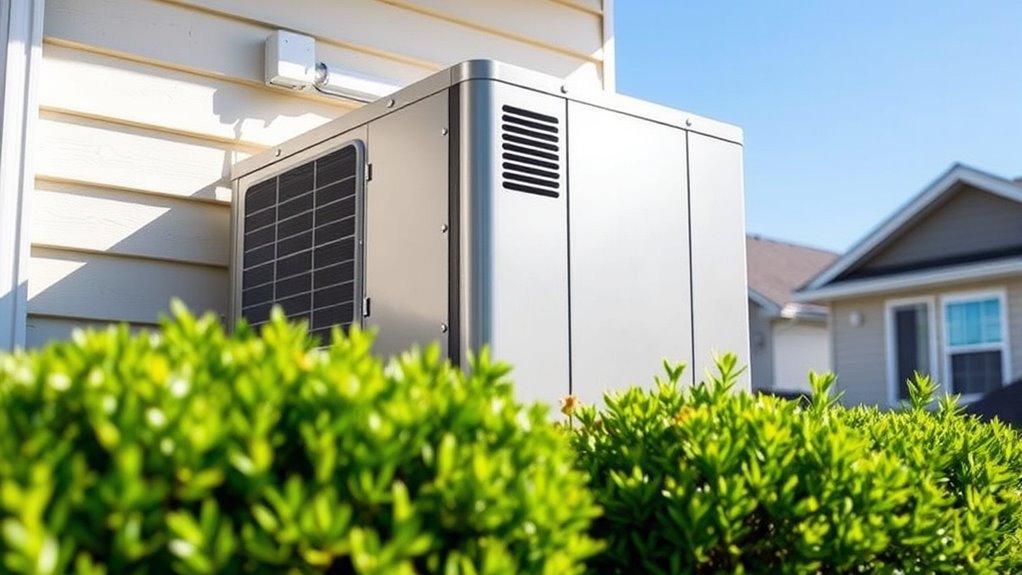
When your current air conditioner shows signs of aging or frequent repairs, exploring alternative cooling and heating options makes sense. A heat pump can effectively replace traditional air conditioning, offering efficient heat transfer for both summer cooling and winter home heating and cooling. Modern heat pumps perform well in moderate climates and some models operate effectively down to -20°F, making climate suitability an important factor. While installation cost varies, federal incentives and rebates from policies like the Inflation Reduction Act can make switching more affordable. Before deciding, guarantee your existing HVAC systems and ductwork are compatible with a heat pump for ideal home comfort. Weighing these factors helps you determine if a heat pump is the right choice for your home.
Frequently Asked Questions
Can a Heat Pump Replace an Air Conditioner?
You might wonder if a heat pump can replace your air conditioner. The answer is yes—during cooling mode, a heat pump works exactly like an air conditioner by removing heat from your indoor air and releasing it outside. Plus, it’s visually similar and highly efficient. Installing a heat pump not only cools your home effectively but also offers the convenience of year-round heating, making it a versatile choice.
Can a Heat Pump Cool as Well as an Air Conditioner?
Yes, a heat pump can cool as well as an air conditioner. It uses refrigerant cycles to remove heat from your indoor air, providing effective cooling during hot weather. Modern heat pumps have high SEER ratings, often over 20, meaning they’re highly efficient. Whether in moderate or cold climates, they deliver reliable, consistent cooling performance, often matching or surpassing traditional AC units.
What Is the Downside of a Heat Pump?
The downside of a heat pump is that its efficiency drops considerably in very cold weather, making it less effective for heating. You might need to use supplemental or backup heat sources, which can increase your energy bills. Additionally, initial installation costs can be higher, especially in colder climates, and some existing systems might require modifications to work with a heat pump.
How Much Does It Cost to Replace an AC With a Heat Pump?
Replacing your AC with a heat pump is like upgrading from a bicycle to a motorcycle—you’ll pay more upfront but gain versatility. Expect costs between $6,000 and $12,000, including equipment and installation, with the equipment itself costing about $700 more than a standard AC. Luckily, federal rebates and incentives can help offset these expenses, making the switch more affordable as technology advances and costs decrease.
Conclusion
Switching to a heat pump is like upgrading from a bicycle to a car—you gain versatility, efficiency, and comfort all in one. Imagine saving money on energy bills while enjoying reliable heating and cooling year-round. If your current AC struggles during cold months, a heat pump could be your game-changer. Making this switch means investing in a system that adapts to your needs, just like a trusty vehicle that gets you through every season smoothly.
